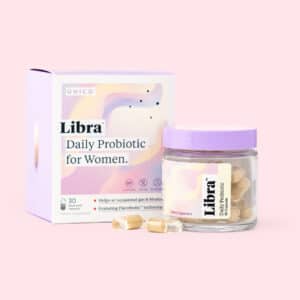Probiotics may be microscopic, but they enormously important for your health. Modern research shows that a healthy gut is crucial to your mental health, immune system, skin, and even your metabolism.
Did your ears perk up when I mentioned metabolism? If so, read on to learn more about what we think are the best probiotic strains for weight loss.

What are Probiotics?
To start things off, let’s talk about what probiotics are.
Probiotics are microorganisms (think bacteria and yeasts) that provide health benefits when taken in certain amounts.1
These microorganisms are named by taxonomy – if you remember the mnemonic “Dear King Philip Came Over For Good Soup,” probiotics are named after the “Good Soup” part, or the genus and species.
A strain is another level of specification, so perhaps a better mnemonic is “Good Spicy Soup.”
Probiotics are naturally found in foods, especially in fermented foods like kimchi, yogurt, kefir, tempeh, and pickles.
You can also use probiotic supplements to get these beneficial microorganisms into your system.
Why Probiotics May Help Weight Loss
Scientists are still figuring out exactly how probiotics affect weight and weight management, but here are some things that they’ve found:
- The first is that the composition of bacteria in the gut is different between lean and larger individuals. Leaner people tend to have more “good” bacteria than bad bacteria in their gut, and a wider diversity of bacterial species.2
- Probiotics can help increase the number of “good” bacteria, reduce “bad” bacteria and pathogens, and improve the diversity of bacteria in the gut.3
- Probiotics may help reduce gut inflammation, improve the integrity of the gut barrier, and assist with increasing satiety.4
- Studies also find that probiotics can be good for weight loss by reducing fat accumulation and increasing insulin sensitivity. 5
Recommended Reading: Did you enjoy reading about how exactly probiotics help you lose weight? Check out our post on how fat burners work.
How Much Weight Can I Lose By Taking Probiotics?
The benefits of probiotics are better known for digestive health, and for things like reducing bloating.
But as outlined above, having the right probiotics in your gut can impact your weight, and lead to healthy weight loss.
How much, you ask?
More research may be needed before accurate estimates can be made, as the amount of studies that indicate weight loss via probiotics are still limited.
That being said, a 2019 meta-analysis and review on the effects of probiotics for weight loss found that probiotic supplementation helped people lose on average between 0.25 to 0.73 kg (or 0.5 to 1.6 lbs).6
Another study found that probiotics may help individuals lose up to 1 kg (2.2 lbs) of fat mass when taken regularly.7
These aren’t exactly dramatic figures, but when you consider that these results were from simple gut bacteria alone – they become slightly more promising!
Combining several of the best probiotic strains for weight loss with a comprehensive diet and exercise program could very well help drive rapid weight loss.
A natural weight loss supplement is another way to complement a healthy diet and exercise program.
Which Probiotic Strains Are Best for Weight Loss?
If you’re considering trying a probiotic strain for weight loss, you have to remember that not any probiotic will do.
The two major groups of bacteria that are studied for their weight loss benefits are Lactobacillus and Bifidobacterium. 8
Here are our top picks for the best probiotic strains for weight loss:
1. Lactobacillus Acidophilus
Lactobacillus acidophilus is one of the most studied probiotics for weight loss.
In a 2019 meta-analysis, multiple strains of Lactobacillus acidophilus have been found to be effective either alone or as part of a multi-strain probiotic to be effective in reducing weight, fat mass, waist circumference, and BMI.9
2. Lactobacillus Gasseri
Two strains of Lactobacillus gasseri, BNR 17 and SBT2055 are effective in reducing weight and increasing fat loss.
A 2010 study found that Lactobacillus gasseri SBT2055 helped reduce bodyweight, abdominal fat, subcutaneous fat, BMI, and hip and waist circumference after 12 weeks.10
A 2018 study found that high dose supplementation with Lactobacillus gasseri BNR 17 significantly decreased visceral fat tissue. Both high and low dose BNR17 supplementation significantly reduced waist circumference after 12 weeks.11
3. Lactobacillus Rhamnosus
L. rhamnosus is unique, and possibly the best probiotic strain for women and weight loss. (Research has not yet found the best probiotic for men’s weight loss.)
A 2014 study on the effects of L. rhamnosus CGMCC1.3724 on weight loss found that women, not men, experienced weight loss with L. rhamnosus probiotics when combined with a low-calorie diet.
In their analysis, researchers found that the L. rhamnosus strain only affected the gut microbiota of women.12
4. Lactobacillus Plantarum
A 2013 study found that a low-calorie diet with Lactobacillus plantarum TENSIA significantly reduced BMI and blood pressure in 3 weeks.13
Multi-strain probiotics containing L. plantarum KY1032 and L. curvatus HY7601 are found in studies to reduce body weight, body fat mass, and percent of fat mass. 14, 15
5. Bifidobacterium Bifidum
B. bifidum is often combined with other probiotic species in clinical trials.
In these trials, the multi-strain probiotics containing B. bifidum and at times other Bifidobacterium species have been effective in reducing weight, waist circumference, and body mass. 12
6. Bifidobacterium Animalis Subsp. Lactis
A 2019 study found that taking Bifidobacterium animalis subsp. lactis CECT 8145 for 12 weeks, especially in its heat-killed form, helped significantly reduce waist circumference, visceral fat, and BMI. 16
Studies suggest that Bifidobacterium animalis subsp. lactis 420 may be beneficial for weight loss by reducing abdominal and visceral fat mass, and decreasing caloric intake by improving satiety. 17
7. Streptococcus Thermophilus
Streptococcus salivarius subsp. thermophilus is another of the bacterial strains that has shown potential promise for weight loss.
A 2013 study using Streptococcus Thermophilus showed that this powerful strain was able to protect against weight gain in young men who ate a high-fat and high-calorie diet for 4 weeks. 18
Animal studies also suggest that Streptococcus thermophilus may reduce weight gain by decreasing inflammation and slowing down the accumulation of fat tissue. 19
Bonus: While not technically a probiotic strain, some postbiotics have been shown to reduce inflammation, which may assist in weight loss.
Bottom Line
Probiotics may help with weight loss by:
- reducing inflammation
- increasing metabolism
- balancing gut microbiota
The magnitude of weight loss from these supplements may be small, but strains from the Lactobacillus and Bifidobacterium groups are shown to help with weight and fat loss.
To get the most out of your probiotic, take it daily for at least 12 weeks.
Many studies show weight loss benefits with consistent use.
You can choose to have a probiotic that has a single strain or multiple strains.
There isn’t solid proof that a multi-strain probiotic is better than single-strain probiotics, so it’s best to focus on overall CFUs (the number of bacteria) and the appropriate probiotic strains. 20
Probiotics aren’t the only thing that matters, these little buggers need food too!
A well-rounded plan will include both pre and probiotics for weight loss.
Prebiotics are fibers that provide an extra boost to your gut health, add in some prebiotics, or food for your gut.
Prebiotic foods include apples, bananas, cabbage, beans and lentils, oats, and chia seeds.
A healthy gut can help you reach your weight loss goals.
Sources:
1https://pubmed.ncbi.nlm.nih.gov/24912386/
2https://pubmed.ncbi.nlm.nih.gov/30875987/
3https://www.ncbi.nlm.nih.gov/pmc/articles/PMC7333005/
4https://pubmed.ncbi.nlm.nih.gov/30987812/
5https://pubmed.ncbi.nlm.nih.gov/31118956/
6https://pubmed.ncbi.nlm.nih.gov/30987812/
7https://pubmed.ncbi.nlm.nih.gov/29547587/
8https://pubmed.ncbi.nlm.nih.gov/30928918/
9https://pubmed.ncbi.nlm.nih.gov/30987812/
10https://pubmed.ncbi.nlm.nih.gov/20216555/
11https://pubmed.ncbi.nlm.nih.gov/29688793/
12https://pubmed.ncbi.nlm.nih.gov/24299712/
13https://www.ncbi.nlm.nih.gov/pmc/articles/PMC3852723/
14https://www.sciencedirect.com/science/article/pii/S1756464615005034
15https://pubmed.ncbi.nlm.nih.gov/28001147/
16https://pubmed.ncbi.nlm.nih.gov/30262813/
17https://pubmed.ncbi.nlm.nih.gov/32218248/
18https://onlinelibrary.wiley.com/doi/full/10.1002/oby.21230
19https://pubmed.ncbi.nlm.nih.gov/32981107/
20https://pubmed.ncbi.nlm.nih.gov/32274669/
Recommended Reading:
- How To Transform Any Diet into an Anti-Inflammation Diet. - September 14, 2022
- Saffron for Depression – This Exotic Spice May Lift Your Mood. - January 18, 2022
- The 7 Best Probiotic Strains for Weight Loss - January 2, 2022

